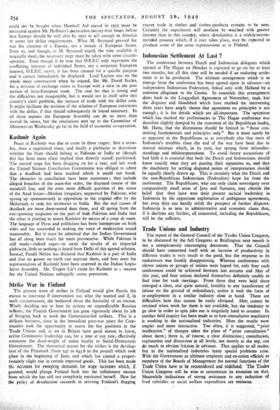Kashmir Again
Peace in Kashmir was due to come in three stages: first a cease- fire, then a negotiated truce, and finally a plebiscite to determine whether the State should belong to Pakistan or India or (though this has been more often implied than directly stated) partitioned. The second stage has been dragging on for a year, and last week the United Nations Conciliation Commission was obliged to admit that a deadlock had been reached which it could not break. The obstacles to conciliation have been numerous ; they include alleged breaches of the cease-fire order, the disputed course of the standstill line, and the even more difficult question of the status of the Azad forces—Moslem irregulars, supported by Pakistan, who sprang up spontaneously in opposition to the original offer by the Maharajah to cede his territories to India. But the real causes of deadlock are more deep-seated than these, and all spring from the ever-growing suspicion on the part of both Pakistan and India that the other is plotting to annex Kashmir by means of a coup de main. The language of Press and politicians has been intemperate on both sides and has succeeded in making the voice of moderation sound treasonable. But it must be admitted that the Indian Government has all along been much the more provocative. While Pakistan is still ready—indeed eager—to await the results of an impartial plebiscite, little or nothing is heard from Delhi of this agreed solution. Instead, Pandit Nehru has declared that Kashmir is a part of India and that no power on earth can separate them, and four seats for representatives of Kashmir have been reserved in the Indian Legis- lative Assembly. Mr. Trygve Lie's claim for Kashmir as r. success for the United Nations unhappily seems premature.






























 Previous page
Previous page